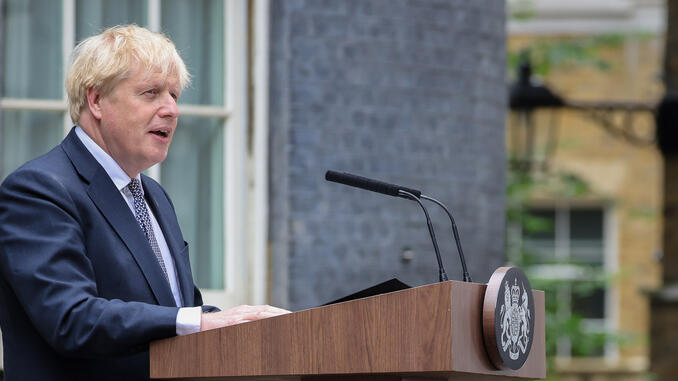
Boris Johnson’s government has finally collapsed, leaving behind a stricken Great Britain. The Prime Minister has managed to escape scandal after scandal, but finally he was forced to throw in the towel on July 7th after an avalanche of resignations in his own party. Speaking outside Ten Downing Street, Johnson said, “It is clearly now the will of the parliamentary Conservative Party that there should be a new leader of that party and therefore a new prime minister.” Johnson resigned immediately as head of the Conservative Party but will remain British Prime Minister until a new party leader can be elected. The process of selecting a new party leader may take as long as six weeks.
Johnson was no stranger to telling falsehoods to the public. The current scandal involved allegations of his party’s deputy chief whip sexually assaulting two men and what Downing Street knew about the whip’s record of abuse. Johnson denied knowing anything about the whip’s pattern of behavior, however, it slowly came to public light Johnson had indeed known. The controversy came just weeks after Johnson survived and was greatly weakened by a no-confidence vote over his holding of raucous parties at Downing Street while the rest of the country was forced into strict lockdown during the Covid pandemic. With the latest scandal, Johnson’s Conservative Party had had enough. What had started with the resignation of his chancellor of the exchequer and health minister, turned to the resignation of 50 ministers, aids, and envoys from his government in less than two days.
Many in the Conservative Party believe Johnson should step down immediately instead of waiting for the election process to pick a new replacement. Former prime minister John Major wrote to the head of the Conservative Party’s 1922 Committee, “The proposal for the prime minister to remain in office—for up to three months—having lost the support of his cabinet, his government and his parliamentary party is unwise, and may be unsustainable.” The Economist, a right of center weekly magazine, also expressed its opinion that Johnson should “go immediately” with a cover image showing a ridiculous image of Johnson in freefall under the title “Clownfall.” The image was from the time Boris Johnson got stuck on a zipline at Victory Park as mayor, waving a British flag in each hand while still in a suite.
In typical Johnson style, he refused to lay blame on himself as he announced his resignation from party leadership outside Downing Street. Instead, he placed the blame on his own party members by likening them to a stampede of animals. “As we have seen at Westminster… when the herd moves, it moves. And my friends, in politics, no one is remotely indispensable,” Johnson said.
Leaders of the rest of the United Kingdom welcomed the news of Johnson’s resignation. Welsh First Minister Mark Drakeford said Johnson did “the right thing” and added “all four nations need a stable U.K. government.” First Minister of Scotland Nicola Sturgeon welcomed the news saying that Johnson had always been “manifestly unfit” to be prime minister. Irish Prime Minister Micheál Martin stated that Johnson’s resignation is “an opportunity to return to the true spirit of partnership and mutual respect that is needed to underpin the gains of the Good Friday Agreement.” Boris Johnson and the European Union have recently been squabbling over the trade status of Northern Ireland bringing deep concerns about the stability of the Good Friday Agreement.
Conservative Party leadership announced that eight candidates will be competing for the party’s top spot. Those candidates are—Kemi Badenoch, Suella Braverman, Jeremy Hunt, Penny Mordaunt, Rishi Sunak, Tom Tugendhat, Liz Truss and Nadhim Zahawi. Rishi Sunak was one of the two party leaders whose resignation triggered the avalanche of resignations that forced Johnson to resign. The first round of voting will begin today, July 13th. The candidate with the least number of votes or garners less than 30 votes will be knocked out of the next round. Party officials are hoping to have the final round of votes by July 21st, when the final two contenders will face a vote by 175,000 grassroots members of the Conservative Party.
Despite the awful leadership—despite the scandals and lies—it will be Brexit that will likely tower over Johnson’s legacy as prime minister. When Johnson entered Ten Downing Street he cut through all the political turmoil and hang-ups and forced the hardest Brexit possible. The divorce was messy and still is—as mentioned above with its implications for the Good Friday Agreement. Johnson’s scandals and lies only added to the acidity of Brexit. Time will show if Brexit was a wise economic choice, or not, and that will forever color Johnson’s legacy.
